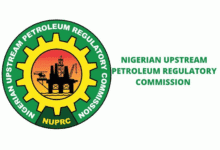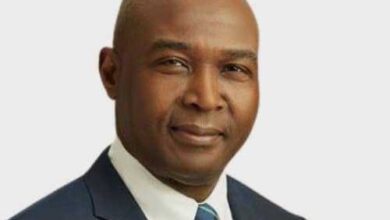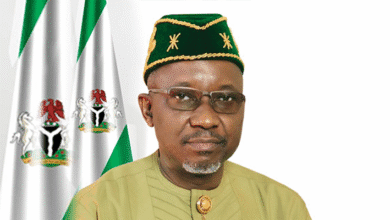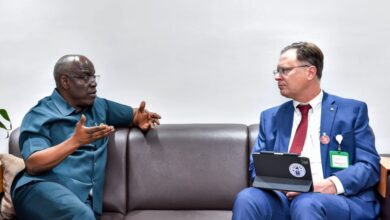NIES: FG Decries Huge Number Of Idle Oil Wells, Woos Investors With Capacities
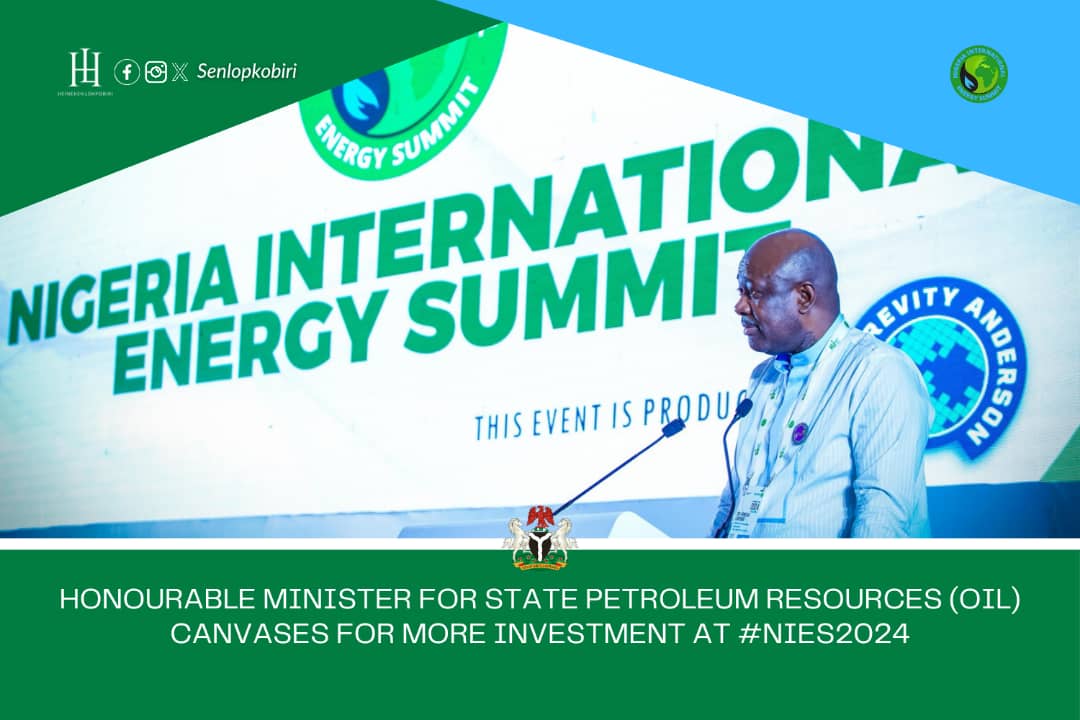
The Federal Government has expressed worries over the huge number of oil wells in the country, therefore, hinted at plans to hand them over to investors, both domestic and foreign with proven capacities for exploration.
Minister of State for Petroleum Resources (Oil), Sen. Heineken Lokpobiri who stated this at the opening session of the 7th Nigeria International Energy Summit (NIES) on Monday at the Presidential Villa, Abuja, said, the idle oil wells if explored would help ramp up the country’s oil production.
TheFact Daily reports that Nigeria is Africa’s largest producer of crude oil, and the world’s 14th largest oil producer and 6th largest exporter of liquefied natural gas (LNG). Its 258 oil fields and over 2,000 well heads produce up to 2 million barrels a day. Regrettably, the country has a huge number of idle wells, particularly, onshore and in the swamp region of the Niger Delta with huge locked-in potential.
Lokpobiri noted that the idle oil wells have no benefits for the country, therefore, there was a need for a paradigm shift to allow companies with proven capacities locally or internationally to explore them for the benefit of Nigerians.
He said: “if you have reserves underground and you do not bring them out, they will translate to nothing and the only way we can make them translate to something is to give it to those who have full capacity both financially and technically, to be able to explore this oil and gas for the benefit of Nigerians and the global energy landscape.
“What we have done in the past is situations where the allocation of blocs is only designed and they end up entering in the pockets of politicians.
“So the paradigm shift this government wants to bring is to make sure that we identify those who have proven capacity locally or internationally so that we’ll be able to explore these resources for the benefit of Nigerians.
“We need to come out with some ingenious ideas to ensure that we have energy security and we need to ramp up production and to ramp up production we have so many idle wells that we can bring to the right people. That is the only way we can guarantee production security in the upstream so that the midstream and downstream can also be successful.”
“We need to increase production in the upstream so that we’ll be able to produce the right quantities that will service our obligations Dangote refinery will be needing about 650,000 barrels per day, we are rehabilitating our government own refineries that once in use will be needing about 450,000 barrels per day, we have a couple of modular refineries that are coming up soon so in a whole, we need to ramp up production to be able to meet our domestic needs to guarantee energy security locally.
Speaking further, Lokpobiri noted that Nigeria must take drastic measures including a deep reflection, to unravel the mystery behind the country’s inability to unlock economic prosperity, despite being blessed with huge oil resources which other countries with massive infrastructures and development occasioned by oil were not fortunate to have.
“Despite the fact that we have abundance of oil and gas reserves, this abundance of reserves hasn’t translated to economic prospects contrary to situations we have found in the Middle East, Saudi, Kuwaiti, and the UAE.
“It is the same resources they have that have been able to translate into prosperity in their own climes. what are they doing that we cannot do? That is a question this summit is supposed to find out. The time has come for this 2024 NIES to unravel what other climes have done to be able to bring economic prosperity to their nations that we have not done.
“Despite the fact that we have maybe a lot more resources in terms of reserves than most of them may have. At the end of this summit, I believe we will be able to resolve that puzzle so that going forward we will be able to transit to real economic prosperity.”
The minister who harped on the need to get the right investments if energy security must be guaranteed, disclosed that contrary to the transition call from the West, Nigeria would not stop the exploration of fossil fuel, as the country would transit at its own pace.
“Everybody is talking about abandoning fossil fuel. America is the largest producer of oil they are. ramping up production, increasing investment but they are asking us to stop. The West is not going down in exploration but we are being asked to slow down or stop investment in fossil fuel. We are not the problem, we are the victim. We will transit at our own pace.
“Our target is to explore these resources in a more environmentally friendly and sustainable way. We’re not stopping. We need the money to be able to transit and for us to transit, we must get the right investments, and for investment to be made, we need finance and the finances will not come unless we come up with some ingenious ways of raising our finances and that is why at the APO level we have come up with the idea of the Africa Energy Bank.”
Lokpobiri also advocated the establishment of an Organisation of Petroleum Exporting Countries (OPEC) bank, regretted that in the last five years, Nigeria has slowed down investments and was currently the lowest globally.
“The only way we can be held back in optimising the potential in the oil and gas industry is our Inability to access finance. If we have access to finance we will invest the way other countries are investing
“In the last five years we have slowed down in investment right now we are the lowest in the world. There must be something we are not doing that we must start doing.
“We.need an OPEC bank. Most of the OPEC members have very deep pockets so that whereas the West is not willing to fund investment in Africa and Middle East, let us get our own money bank that can afford our own investment.”
On timelines for the operationalisation of refineries, the minister disclosed that the first phase of the Port Harcourt refinery has already started, the Warri refinery would be completed between the next two months and the Kaduna refinery would also be completed soonest.
He however warned that, “if you do not ramp up production, if you do not get the right investment we won’t be able to get it right and that is why this summit is important.
On Divestment, while assuring IOCs that government has resolved to make the environment more conducive for business, he, however, noted that no IOC would be stopped from leaving Nigeria
“As.govenment we will do whatever is necessary to promote resources. Divestments have been handled carefully by the government so that we can be globally competent and all the issues about divestment will be resolved within a fairly short time.
“The government has given us very clear direction to create an environment for businesses to thrive and any IOC who wants to invest in oil and gas should come to Nigeria and invest but if you want to divest, you are free to divest. We have local capacity that can continue from where you stopped and improve on what you have done.”
Also speaking, the Minister of Petroleum Resources (Gas), Hon. Ekperikpe Ekpo said, “the gas industry, with abundant domestic reserves of proven 208TCF of gas and exploration potential, is crucial for enhancing energy security. In the light of the above, Nigeria has no business with energy poverty”.
Hon. Expo, however, said, “to unlock the full potential of gas resources, attracting both domestic and foreign investments is important. Collaboration with international partners, financial institutions, and the private sector is pivotal for securing funding for gas infrastructure development”.
The Minister disclosed that the country’s
journey towards a gas-focused economy is the Ajaokuta-Kaduna-Kano (AKK) pipeline, adding that significant progress has been made in the construction of the critical infrastructure project, and assured that the country is on track to ensure its completion and commissioning as scheduled.
He said, “The Obiafu/Obrikom/Oben (OB3) is a vital piece of gas infrastructure for the supply of feedstock to the AKK pipeline. This pipeline is among the biggest gas transmission systems in both Nigeria and Africa. I am highly elated to announce that going by the Contractor estimates, the OB3 pipeline will be completed by March 2024 and the 42” 127 km pipeline will supply 2BCF per day.
“Upon completion, this pipeline is intended to supply the AKK pipeline with gas from the three fields of Obiafu, Obrikom, and Oben”, he added.
On his part, the Secretary-General, African Petroleum Producers Organisation (APPO), Dr. Omar Farouk Ibrahim said, the solutions to the climate challenge being pushed forward by the developed countries are not the best for Africa, therefore, urged African academics, intellectuals, and thought leaders to put on their thinking caps and to see the imperative of a new paradigm shift in the search for solutions to the climate challenge.
Dr. Ibrahim said, the Association was working in collaboration with the Management of the African Export-Import Bank (Afreximbank) to launch African Energy Bank for the financial need of the energy sector in Africa.
He disclosed that seven countries, Algeria, Egypt, Nigeria, Ghana, South Africa, Benin Republic, and Cote d’Ivoire are in the race for where the bank will be located, adding that the bank will take off on or before 30th of June 2024.
Speaking, the OPEC Secretary-General, His Excellency, Haithan AI Ghais said, the OPEC takes great pride in its strong and enduring African connections and identity, disclosing that half of the members of the organization are African and this includes the most popular African country, Nigeria, and the geographically largest by area, Algeria.
“We’re also very privileged to count on Congo, Equatorial Kenya, Gabon, and Libya as member countries. Additionally, two African countries have joined the historic declaration of cooperation, widely known as the OPEC Plus Agreement, between OPEC and 10 non-OPEC-producing countries, and those two are Sudan and South Sudan.
We are also in talks with many more other African countries”, he said.
The OPEC Scribe said, the Organisation anticipates a very bright future for Africa’s oil industry with substantial opportunities for growth, saying, that the continent is home to five of the top 30 oil-producing countries around the world, with proven reserves of more than 120 billion barrels at the end of 2022.
Earlier, in his Opening Remarks, the Chairman of the Independent Petroleum Producers Group (IPPG), and Waltersmith Group, Mr. Abdulrazaq Isa said, “in light of the ongoing IOCs divestments in Nigeria, it is evident that an unprecedented transformation is ongoing, and will culminate in a new order here in Nigeria”, adding that Indigenous operators will gain incremental expertise, leading to capacity growth in the industry.
Mr. Isa said, the divestment of oil and gas assets in Nigeria, will foster greater sustainability, inclusivity, and prosperity within the industry and the broader economy.
He advocated that the headquarters of the African Energy Bank, being led by Apo, be located in Nigeria.


